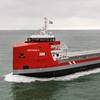Privinvest’s Deliveries to Mozambique: A Model for Africa
Media reports about Mozambique’s failure to launch a fishing and security fleet and its subsequent $2 billion debt default seem destined to torpedo, or at least set back similar efforts to build needed coastal security and national fishing fleets across Africa. That must not happen.
The systems and equipment Mozambique bought a few years ago from shipbuilder Privinvest could serve as a template for coastal African nations seeking to rightfully benefit from their natural resources and lift their populations out of poverty.
I have long monitored African maritime security challenges from piracy to other illicit activities in that vast continent’s rich exclusive economic zones and welcomed an opportunity to conduct a thorough, independent assessment of the Mozambique maritime projects. I concluded the vessels, systems and equipment procured by Mozambique are appropriate to the tasks for which they were acquired, including commercial fishing and coastal security. They can advance Mozambique’s economic and security interests and can help other African nations do the same.
Mozambique is the world’s second-poorest nation (behind the Democratic Republic of Congo) yet it is remarkably rich in offshore resources. Its undersea natural gas reserves of nearly 3 trillion cubic meters ranks as the world’s 13thlargest. The nation’s abundant fish stocks can be a source of revenue, jobs and much needed dietary diversity, according to the World Health Organization. In addition, Mozambique’s 1,400-mile coastline and three deep-water ports are well-positioned to build a robust regional ship repair and maintenance industry to serve its own fleets and commercial vessels of other nations operating in the Indian Ocean.
Mozambique, like many coastal nations in Africa, faces the threats of piracy, sea robbery, smuggling, trafficking in drugs, weapons and people and illegal migration.
The Mozambique maritime projects wisely took a comprehensive approach to Mozambique’s opportunities and challenges with a plan to secure its sovereign waters, create a viable offshore fishing industry and begin building a maritime industrial sector.
The government pursued an integrated solution and acquired a range of capabilities that included maritime domain awareness radar sites, operations centers, patrol vessels, aircraft, an afloat-maintenance ship and fishing vessels. Privinvest was a good choice as a supplier because of its network of shipyards and record of building integrated maritime systems for major navies. The ships are modern, capable, and impressive, yet not overly complex.
Privinvest also delivered operating-base enhancements, shipbuilding and repair facilities, training classrooms and programs, spare parts and transferred intellectual property licenses and technologies. The set of capabilities is a solid foundation for growing a larger maritime capability.
Mozambique launched the projects with minimal maritime infrastructure, few professional mariners, and without the direct involvement of its armed forces.
Unfortunately, the undertaking lacked a national strategy to attract, recruit and retain the minimum number of personnel needed to operate and maintain the acquired maritime capability and infrastructure.
But all is not lost. Mozambique can still revive the fleets and systems and the rest of Africa can learn from the experience.
Like Mozambique, Tanzania, Mauritania and Senegal have massive natural gas discoveries. Ivory Coast, Angola, Algeria, Egypt, Equatorial Guinea, Republic of Congo and Cameroon have major finds as well. African waters are also a major source of the world’s seafood, with Congo, Somalia, Guinea and Gambia among the world’s fastest-growing fish export countries.
If they are building from a nascent maritime infrastructure, other African nations first step must be to prioritize the recruiting, training, and retention of personnel. Buying the correct vessels and systems and using them effectively are two different things. Without trained, motivated crews, capable vessels, like those of Mozambique, are likely to become expensive, dormant waterfront decorations.
Second, nations should take advantage of existing organizations of their armed forces to avoid duplicative overhead costs and to use the military personnel system to recruit and manage talent. This also enhances interoperability with regional navy and air force command and control systems.
Third, take a comprehensive approach. Selecting a multifaceted contractor like Privinvest that can deliver modern fishing and security vessels, littoral surveillance systems and vessel maintenance and repair has significant downstream benefits. This approach can ensure uniform design as well as a consistent and reliable supply chain and maintenance.
Finally, Mozambique was smart to buy the intellectual property rights to the vessels it acquired. This gives it the ability to build an indigenous shipbuilding and ship repair industry and earn revenue by selling to other countries that want to “buy African.”
By turning a “tuna scandal” into an opportunity, Mozambique could become a maritime leader and an enviable model for a new maritime Africa.











